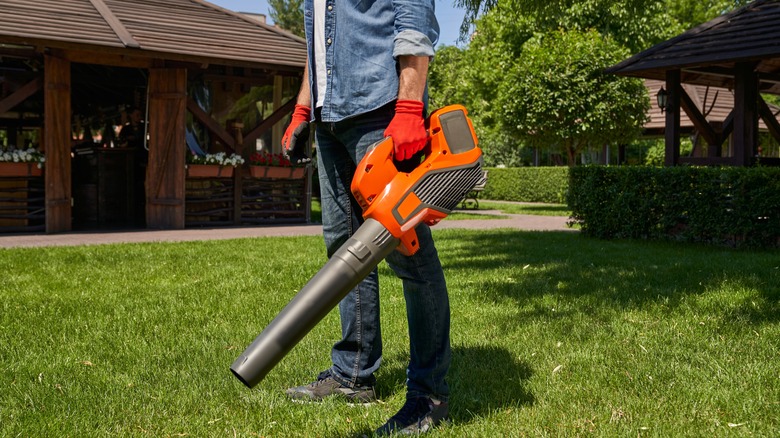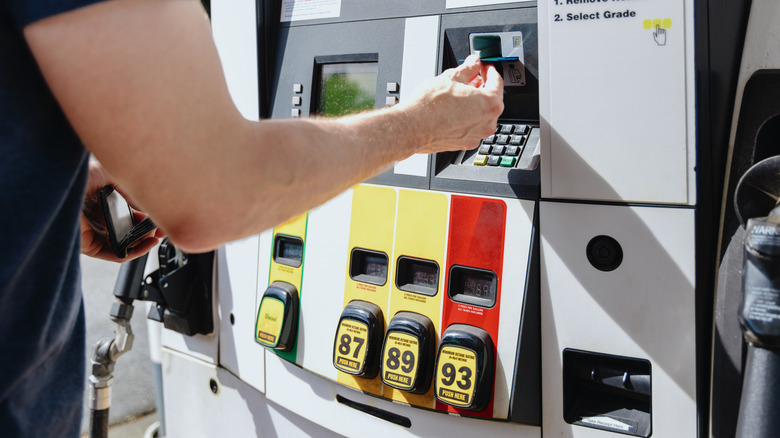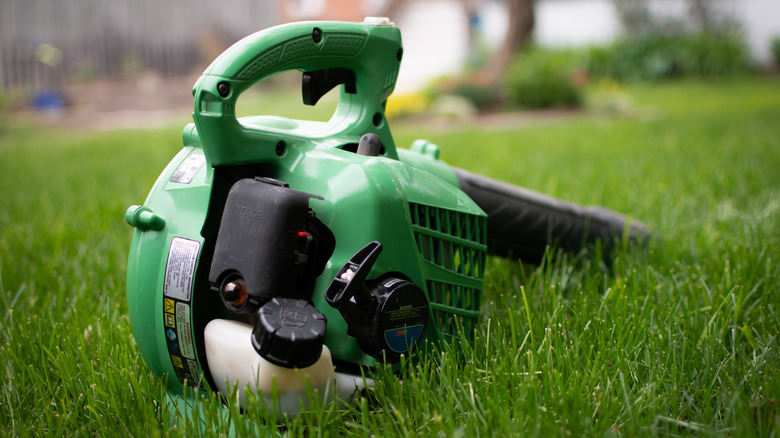Can You Use Premium Gas In A Leaf Blower? Here's What Happens If You Do
When we think of premium gas, the chances are we're thinking of gas-guzzling supercars having their tanks filled with a performance-enhancing nectar. A nectar that carries a premium cost and lets supercars and other high-performance engines really stretch their legs. However, that same fuel is unlikely to turn even the most powerful gas-powered leaf blower into a hurricane-generating machine that sends your leaves into orbit. Indeed, because of the nature of the premium fuel and what it brings to the table, there are no significant advantages. On the contrary, there may be downsides, including engine damage and, of course, cost.
The main difference between premium and regular gas comes down to octane levels. Although additive content is also worth discussing. Premium gas has a higher octane rating, typically 91 or over. This helps to prevent engine knock in high-compression engines (a category that doesn't include leaf blowers). Depending on the brand, it also tends to contain more additives like detergents and stabilizers. While this is all well and good when filling up your all-American supercar, the points are largely irrelevant when it comes to low-compression engines like those found on most leaf blowers. Conversely, rather than offering a performance boost to leaf blowers, premium fuels, especially those with high-ethanol content, may end up damaging your engine.
Going premium doesn't help leaf blowers
A major difference between premium and regular gas is the octane level. Premium fuel usually has a higher octane rating of 91 or above. For comparison, regular fuel is typically rated 87, and midgrade is between 89 and 90. The primary benefit of higher-octane levels is that they allow high-performance, high-compression engines to burn fuel at higher temperatures and pressures, while reducing engine knock. The result is that more of the energy contained in the gasoline is turned into mechanical power. Or, more bang for your buck, if you'd prefer.
However, this performance gain is restricted to such high-performance engines. According to the MIT School of Engineering, this advantage is specific to high-compression engines. Not an engine category that can be applied to leaf blowers. When it comes to fuel additives, the defining line between regular and premium gas isn't so clear-cut. The American Automobile Association (AAA) found that the biggest difference in long-term performance comes not from octane levels but from the quality of the additives. Their testing found that Top Tier gasoline – which can be either regular or premium — kept engines significantly cleaner than non-Top Tier fuels.
Finally, we come to a specific additive — ethanol. In low compression engines, ethanol's tendency to absorb water can lead to corrosion and degraded performance. This is why companies, including Honda, recommend avoiding gasoline with an ethanol content higher than 10%. Fuel pumps typically indicate ethanol levels with E10, representing 10% ethanol, E15 representing 15%, and so on.
Blowing your money away
We've now established that putting premium fuel in your leaf blower isn't going to deal with all those fall leaves any quicker. And, in extreme cases, using the wrong ethanol rating may end up damaging your engine and costing you money. However, even without any expensive engine damage, the higher cost of premium fuel will leave you out of pocket. At the time of writing, the average cost of a gallon of regular gas at American pumps is $3.133 per gallon, with premium fuel costing $3.979. With some rounding applied to the figures, the difference works out to approximately $0.85. While fuel consumption varies by model, a typical backpack-style blower will consume around 0.43 gallons of gas per hour. This means using premium gas will cost an extra $0.37 for every hour you use it. It might not be much, but you're literally just blowing that money away.
But there's another option that we haven't considered yet — ethanol-free gasoline. Some manufacturers, including Husqvarna and Troy-Bilt, recommend using ethanol-free gasoline in outdoor power equipment, including leaf blowers. However, while this may save on engine wear, it can be hard to find and can cost anywhere from $0.30 to $1.00 more than E10-rated gasoline. It may not always be convenient, and it may be more expensive than even premium gasoline, but if you want to splash out on better fuel for your leaf blower, this is a better option than premium gasoline.


